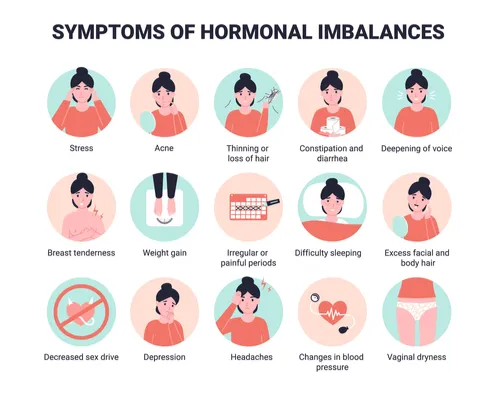
Hormones play a crucial role in regulating various bodily functions, including sexual desire. Fluctuations in hormone levels can significantly impact libido for both men and women, influencing their sexual health and relationships. In this blog, we will explore how hormonal changes affect sexual desire, the impact of menopause, and potential treatments to balance hormones.
Understanding Hormonal Changes
Hormones are chemical messengers produced by glands in the endocrine system. They regulate numerous processes, including metabolism, mood, and sexual function. For both men and women, fluctuations in hormone levels can occur due to various factors, including age, lifestyle, and health conditions.
1. Hormonal Cycles in Women
- Menstrual Cycle: Women’s sexual desire often fluctuates throughout their menstrual cycle due to varying levels of estrogen and progesterone. Research shows that libido can peak around ovulation when estrogen levels are highest, promoting sexual interest and arousal.
- Pregnancy and Postpartum: Pregnancy brings significant hormonal changes, often resulting in increased libido for some women due to elevated estrogen and blood flow to the pelvic region. However, postpartum hormonal fluctuations can lead to decreased sexual desire, especially if combined with physical recovery and emotional adjustments.
2. Hormonal Changes in Men
- Testosterone Levels: Testosterone is the primary hormone influencing male libido. Levels typically peak during adolescence and early adulthood, gradually declining with age. Low testosterone levels can lead to reduced sexual desire, erectile dysfunction, and other health issues.
- Psychological Factors: Stress, anxiety, and depression can also impact testosterone levels, further affecting libido. It’s essential for men to consider both physical and mental health factors when addressing changes in sexual desire.
The Effects of Menopause on Sexual Desire
Menopause marks a significant hormonal transition for women, typically occurring between the ages of 45 and 55. The decline in estrogen and progesterone levels can lead to various physical and emotional changes that affect sexual desire:
1. Decreased Estrogen Levels
- Vaginal Dryness: Lower estrogen levels can cause thinning and drying of vaginal tissues, making intercourse uncomfortable and reducing sexual desire.
- Hot Flashes and Mood Changes: Common menopausal symptoms, such as hot flashes and mood swings, can further contribute to decreased libido and intimacy challenges.
2. Emotional Factors
- Body Image Concerns: Changes in body shape and function can impact a woman’s self-esteem and sexual confidence, contributing to lower sexual desire.
- Relationship Dynamics: The emotional and relational aspects of entering menopause can affect how partners relate to one another, influencing sexual desire and intimacy.
Treatments to Balance Hormones and Boost Libido
Addressing hormonal imbalances can help improve sexual desire and overall sexual health. Here are some treatment options:
1. Hormone Replacement Therapy (HRT)
- Estrogen and Progesterone Therapy: HRT can help alleviate symptoms of menopause by restoring hormone levels, addressing issues like vaginal dryness and mood swings. This treatment can enhance sexual desire and comfort during intercourse.
- Testosterone Therapy for Women: In some cases, testosterone therapy may be considered for women experiencing low libido due to hormonal imbalances. Consultation with a healthcare provider is essential to discuss potential benefits and risks.
2. Lifestyle Changes
- Regular Exercise: Engaging in regular physical activity can help regulate hormone levels, improve mood, and boost libido. Activities such as yoga, strength training, and aerobic exercises can be beneficial.
- Balanced Diet: A nutritious diet rich in healthy fats, lean proteins, and whole grains can support hormonal health. Foods containing phytoestrogens, such as soy products and flaxseeds, may help balance hormones.
3. Stress Management
- Mindfulness and Relaxation Techniques: Practices like meditation, deep breathing exercises, and mindfulness can help reduce stress and anxiety, positively influencing hormonal balance and sexual desire.
- Open Communication: Discussing concerns and feelings with a partner can alleviate relationship stressors, fostering a supportive environment that encourages intimacy and desire.
Conclusion
Hormonal changes can significantly impact sexual desire for both men and women, affecting their sexual health and relationships. Understanding these changes, especially during critical life stages like menopause, can help individuals navigate the complexities of sexual desire. By exploring treatment options and making lifestyle adjustments, those affected by hormonal fluctuations can regain their sexual confidence and enhance their intimate relationships.

